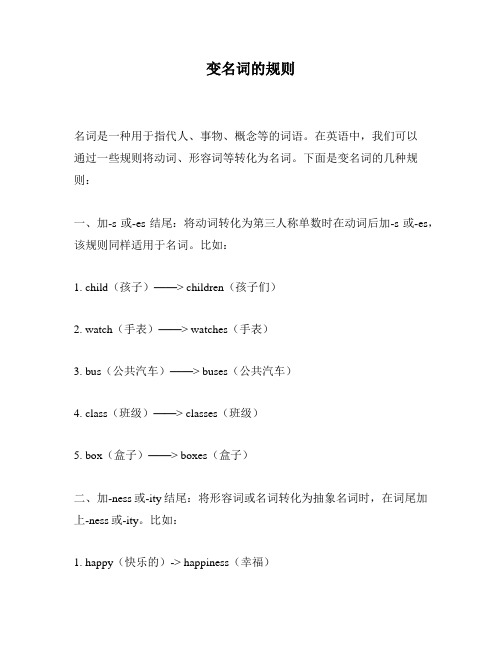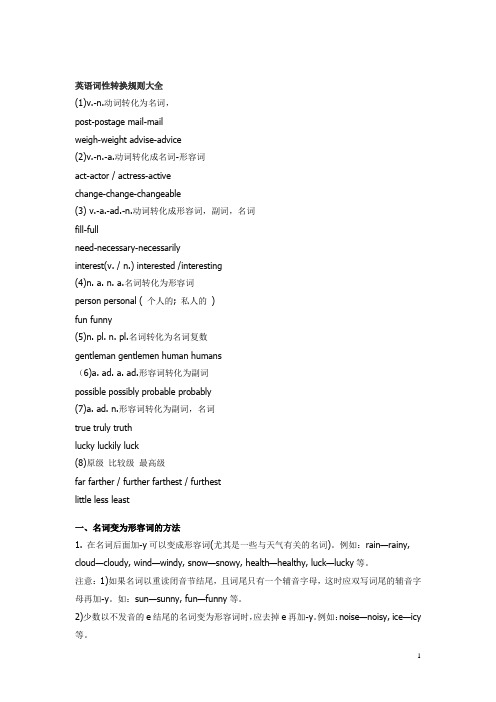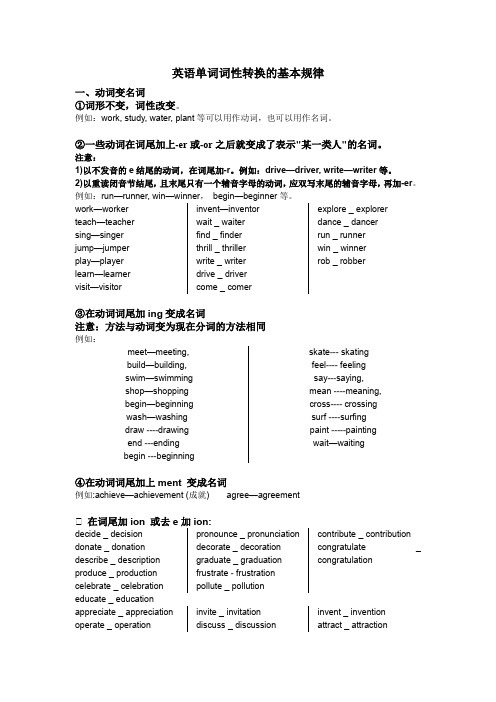动词变名词、形容词
变名词的规则

变名词的规则名词是一种用于指代人、事物、概念等的词语。
在英语中,我们可以通过一些规则将动词、形容词等转化为名词。
下面是变名词的几种规则:一、加-s或-es结尾:将动词转化为第三人称单数时在动词后加-s或-es,该规则同样适用于名词。
比如:1. child(孩子)——> children(孩子们)2. watch(手表)——> watches(手表)3. bus(公共汽车)——> buses(公共汽车)4. class(班级)——> classes(班级)5. box(盒子)——> boxes(盒子)二、加-ness或-ity结尾:将形容词或名词转化为抽象名词时,在词尾加上-ness或-ity。
比如:1. happy(快乐的)-> happiness(幸福)2. dark(黑暗的)-> darkness(黑暗)3. long(长的)-> length(长度)4. able(有能力的)-> ability(能力)5. active(活跃的)-> activity(活动)6. brave(勇敢的)-> bravery(勇气)三、加-ment或-ion结尾:将动词或形容词转化为抽象名词时,在词尾加上-ment或-ion。
比如:1. develop(发展)-> development(发展)2. entertain(娱乐)-> entertainment(娱乐)3. govern(治理)-> government(政府)4. inform(通知)-> information(信息)5. imagine(想象)-> imagination(想象力)四、加-er或-or结尾:将动词或名词转化为表示人或物的名词时,在词尾加上-er或-or。
比如:1. teach(教)-> teacher(教师)2. write(写)-> writer(作家)3. act(表演)-> actor(演员)4. invent(发明)-> inventor(发明家)5. defend(防御)-> defender(防守者)五、加-ism结尾:将名词转化为抽象名词时,在词尾加上-ism。
初中英语词性变化归类

初中英语词性变化一、动词变名词1. V+ ment结尾P2 2.V+ tion 结尾P2 3.V+ ance结尾P3 4.V+ ing结尾P3 5.V+er/or n+ist/man/ian P3 V+ 其他P4 二、名词/动词变形容词1名词+y P5 2.名词/动词+ed(+ing)P5 3.名词+ ful/less P5 4.名词/动词+ able P65.名词+ ous P66. ce 变t P67. +al 结尾P6 8.名词+ ly P79.+ en 结尾P710. 其他P7三、形容词变副词1.形容词+ ly P72. 以le 结尾的去e + y P83. 辅音字母+ y 变ily P84.特殊P8 四、形容词变名词adj+ness P9五、形容词变动词P9六、名词---形容词—副词P9七、方位的词名词—形容词P9八、四大洲名词-----形容词P9九、既是形容词又是副词P9十、反义词+un/im/in/dis P10中考复习:初中英语短语汇总1.To do 结构题P112.ing 结构P113.既to 又ing P124.do 动词原形P125.双宾语P126.Be 动词结构P127.Go , get……结构P138.固定搭配P13--P16初中英语词性变化一、动词变名词1.v+ ment结尾achieve --- achieve ment成就advertise --- advertise ment 广告agree --- agree ment同意apart---apart ment公寓amuse---amuse ment 娱乐argu e --- argu ment争吵commit --- commit ment奉献compl y---compli ment称赞,恭维develop--develop ment发展disagree --- disagree ment不赞同depart---depart ment局,部excite---excite ment兴奋,激动expert专家---experi ment实验,试验equip 装备--- equip ment装备,器材govern 统治--- govern ment政府improve—improve ment改进---self-improve ment自我改善manage---manage ment 经营管理punish惩罚---punish ment惩罚2.V+ tion 结尾attract --- attract ion吸引collect—collect ion收集,收藏invent--- invent or / invent ion发明instruct --- instruct ion指导,介绍predict ---predict ion预言suggest ---suggest ion建议,暗示celebrat e—celebrat ion庆祝communicat e---communicat ion交流,沟通educat e --- educat ion教育educat or—education al--educational ist graduat e --- graduat ion毕业operat e - operat ion操作,动手术opera戏剧introduc e ---introduc tion介绍illustrat e --- illustrat ion阐明,举例说明pollut e --- pollut ion污染translat e—translat ion翻译,译文translat or compet e --- compet ition竞争,比赛produc e—produc t—product ion生产,产品organiz e—organiz ation—organize r—organ ize d有组织的imagin e --- imagin ation想象力invit e --- invit ation邀请inspir e---inspir ation灵感,鼓舞人心的prepar e---prepar ation准备discuss --- discuss ion讨论express ----express ion词语;表达impress --- impress ion印象conclu de --- conclu sion结论deci de --- deci sion决定resol ve --- resol ution决心sol ve ---sol ution解决方法admi t --- admi ssion承认permi t --- permi ssion允许descri be --- descri ption描写,描绘pron ou nc e ---pron u nc iation3.V+ ance 结尾allow --- allow ance允许appear--appear ance外貌,出现dis appear perform--perform ance演出perform er exist --- exist ance存在4.V+ ing 结尾bath e洗澡---bath ingend 结束--- end ing结尾,结局train 训练,火车---train ing训练mean ---- mean ing意义say--- say ing谚语remind --- remind ing提醒5.V+er结尾(…人)bank—bank er银行家blend混合v—blend er搅拌机clean---clean er清洁工cook烹饪,n厨师—cook er厨具,炊具draw画—draw er抽屉-draw ing绘画n dress连衣裙,穿衣—dress er梳妆台employ-employ er雇主,老板-employ ee雇员engine---engine er工程师garden花园v栽培花木---garden er园艺工farm农场v耕作---farm er农民fight---fight er战士foreign—foreign er外国人interview采访—interview er面谈者labor---labor er劳动者learn---learn er学习者/初学者murder---murder er杀人犯own---own er主人paint—paint er画家—paint ing油画play---play er选手,运动员perform—perform er—perform ance表演n print---print er印刷工read---read er读者report—report er记者research---research er研究员sell—sell er售货员sing---sing er歌唱家ski--ski er滑雪者speak—speak er演讲者,喇叭teach---teach er教师think---think er思想家travel---travel er旅游者wait—wait er服务员—wait ress女服务员wash—wash er洗衣机work---work er工人dance---dance r舞蹈家zoo-keep---zoo-keep er动物园饲养员drive---drive r司机explore---explore r探险家lose丢失—lose r失败者—los t迷失love---love r爱好者manage---manage r经理observe---observe r观测者/观察员office—office r警官,官员organiz e—organize r—organize d有组织的organiz ation组织,机构strange—strange r陌生人typewrite—typewrite r打字机village—village r村民wrestle---wrestle r摔交者write---write r作家begin---begin ner初学者/新手run---run ner跑步者/信使swim---swim mer游泳者win—win ner胜利者pass a ge---pass e nge r旅客laugh—laugh ter笑声soldi er士兵geography--geograph er地理学家6. V+or结尾(…人)act---act or男演员auth or作家collect---collect or收藏家conduct---conduct or列车员doct or医生edit---edit or编辑invent---invent or发明家profess---profess or教授sail---sail or水手translate---translat or翻译家visit—visit or参观者,游客三、以-ist结尾。
英语动词、名词、形容词变化规律

英语动词、名词、形容词变化规律动词后+ -ed的变化规则1、一般情况下,动词词尾加 -ed,如: work ---worked play---played wanted----wanted act----acted2、以不发音的-e 结尾动词,动词词尾加-d,如:live---lived move----moved taste---tasted hope---hoped3、以辅音字母+ y结尾的动词,把-y变为-i 再加-ed,如:study---studied copy---copied cry---cried carry---carried4、以一个辅音字母结尾的重读闭音节动词,双写词尾辅音字母,再加 -ed,如:stop ---stopped5、不规则动词的过去式变化规律性不强,须多加记忆。
go –went make –made get – got buy - bought come - came fly-flew 不规则动词的过去式的构成1.把动词原形中的i改为a,变成过去式。
如:begin—began,drink—drank,give—gave,ring—rang,sing—sang,sit—sat,swim—swam2.把重读开音节中的i改为o,变成过去式。
如: drive—drove,ride—rode,write—wrote3.改动词原形中的aw /ow为ew,变成过去式。
如:draw—drew,grow—grew,know—knew,throw—threw (动词show除外,show—showed)4.动词原形中的e改为o,变成过去式。
如:get—got,forget—forgot 5.动词原形中的ee改为e,变成过去式。
如:feed—fed,meet—met6.动词原形中的eep改为ept,变成过去式。
如:keep—kept,sleep—slept,sweep—swept7.动词原形中的eak改为oke,变成过去式。
高中英语---动词、形容词变名词词性转换规律

3.V+ ance 结尾 allow —— allowance 允许 appear —— appearance 外貌 ,出现 perform —— performance 演出 exist —— existence 存在
4.V+ ing 结尾 end —— ending 结尾,结局 train ——training训练 mean —— meaning 意义 say—— saying 谚语 remind —— reminding提醒 bathe ——bathing沐浴
6、V+ 其他 beg——beggar 乞丐 sit——seat 座位 believe —— belief 信仰 behave —— behavior 行为 know—— knowledge 知识 fly—— flight 飞行 mix —— mixture 混合物 press —— pressure 压力 serve —— service 服务 succeed ——success 成功 pursue —— pursuit 追求,从事 propose —— proposal 建议 withdraw —— withdrawal 取钱;收回;撤退 survive —— survival--survivor 幸存者 arrive —— arrival到达 analyze —— analysis 分析
高中英语---动词、形容词变名词 词性转换规律
1.v+ ment 结尾 achieve —— achievement 成就 advertise —— advertisement 广告 agree —— agreement 同意 amuse——amusement 娱乐 commit —— commitment 承诺,奉献 develop —— development 发展 disagree —— disagreement 不赞同 equip 装备 —— equipment 装备,器材 govern 统治 —— government 政府 manage——management 经营,管理 argue —— argument 争吵
英语单词词性转换

英语单词词性转换一、动词v.→名词n.1、词尾加上-er或-or之后就变成了表示"某一类人"的名词例如:work—worker, teach—teacher, sing—singer,jump—jumper, play—player, learn—learner,visit—visitor, invent—inventor,collect—collector等.注意:1以不发音的e结尾的动词,在词尾加-r.例如:drive—driver, write—writer等.2以辅音字母开头并以元音字母加辅音字母结尾的单词,应双写末尾的辅音字母再加er; 例如:run—runner, win—winner,begin—beginner等.2.在动词词尾加上-ment 变成名词例如:achieve—achievement 成就advertise—advertisement例如:argue—argument争论3.在动词词尾加上-tion/sion变成名词例如: attract—attraction; instruct—instruction;invent—invention discuss—discussion;express—expression educate—education;graduate—graduation; operate—operation 去e再加"ion"compete—competition; organize—organization 把e改成其他字母再加"tion"decide—decision conclude—conclusion 把de改为s再加"ion"describe—description描写,描绘这是特例,不规则变化4.在动词词尾加上-ance变成名词例如: appear—appearance 外貌;出现perform—performance 演出accept—acceptance 接受resist-resistance n.抵抗,阻力5.在动词词尾加-ing变成名词方法与动词变为现在分词的方法相同例如:meet—meeting build—building wait—waitingbathe—bathing say—saying谚语 mean—meaning注意:以辅音字母开头并以元音字母加辅音字母结尾的单词,应双写末尾的辅音字母再加-ing 如:swim—swimming shop—shopping begin—beginning二、动词v.→形容词adj.1.动词后面加able,以e结尾的动词则去e加able,表示具有此性质,特点或属性.例如: afford-affordable;love-lovable2.动词后面加ed,以e结尾的动词则直接加d,表示被动性的属性或特点.例如: scatter-scattered use-used3不规则的动词则必须记忆,记住其过去分词形式.规律不大,意义同b.三.名词n.→形容词adj.1.在名词后面加-y可以变成形容词尤其是一些与天气有关的名词例如: rain—rainy, cloud—cloudy, wind—windy, snow—snowy,health—healthy, luck—lucky,anger—angry guilt—guilty内疚的tourist—touristy游客多的 , salt 盐—salty 咸的silk丝绸—silky丝绸般的, sleep—sleepy 昏昏欲睡的注意:1如果以辅音字母开头并以元音字母加辅音字母结尾,这时应双写辅音字母再加"-y".如: sun—sunny, fun—funny, fog—foggy有雾的, fur—furry毛皮的2少数以不发音的e结尾的名词变为形容词时,应去掉e再加"-y".如: noise—noisy, ice—icy, shine—shiny发亮的, taste口味—tasty甜的2.名词后面加-ed,以e结尾的直接加d.例如: spot斑点—spotted有斑点的; talent—talented 有天赋的organize—organized 有组织的; balance—balanced平衡的3.一些抽象名词在词尾加-ful可以变为形容词例如:care—careful, thank—thankful, help—helpful,use—useful, meaning—meaningful4.在名词后加-less构成含有否定意义的形容词例如:care—careless粗心的, use—useless无用的hope—hopeless没希望的,home—homeless无家可归的5.一些以-ce结尾的名词,把-ce改为-t变成形容词例如: difference—different, silence—silent, confidence—confident 6.在名词后加-ly变为形容词例如: friend—friendly, love—lovely, live---lively7.在名词后加-ous变为形容词例如: danger—dangerous prosperous a 繁荣的pro 在前+sper 希望+ous 8.名词后面加-al变为形容词例如: music—musical; medicine—medical 这个比较特殊9名词后面加-able变为形容词,如果以e结尾就去e再加"-able".例如: adjust—adjustable 可调整的 value—valuable有价值的10.名词后面加-en变成形容词例如: wood—wooden 木制的 wool—woolen 羊毛的四.形容词adj.→副词adv.▲一般在形容词的词尾加-ly可以变成副词例如: quick—quickly, slow—slowly, loud—loudly, sudden—suddenly 等例如:possible—possibly, terrible—terribly。
英语词性转换规则大全

英语词性转换规则大全(1)v.-n.动词转化为名词,post-postage mail-mailweigh-weight advise-advice(2)v.-n.-a.动词转化成名词-形容词act-actor / actress-activechange-change-changeable(3) v.-a.-ad.-n.动词转化成形容词,副词,名词fill-fullneed-necessary-necessarilyinterest(v. / n.) interested /interesting(4)n. a. n. a.名词转化为形容词person personal ( 个人的; 私人的)fun funny(5)n. pl. n. pl.名词转化为名词复数gentleman gentlemen human humans(6)a. ad. a. ad.形容词转化为副词possible possibly probable probably(7)a. ad. n.形容词转化为副词,名词true truly truthlucky luckily luck(8)原级比较级最高级far farther / further farthest / furthestlittle less least一、名词变为形容词的方法1. 在名词后面加-y可以变成形容词(尤其是一些与天气有关的名词)。
例如:rain—rainy, cloud—cloudy, wind—windy, snow—snowy, health—healthy, luck—lucky等。
注意:1)如果名词以重读闭音节结尾,且词尾只有一个辅音字母,这时应双写词尾的辅音字母再加-y。
如:sun—sunny, fun—funny等。
2)少数以不发音的e结尾的名词变为形容词时,应去掉e再加-y。
例如:noise—noisy, ice—icy 等。
2. 一些抽象名词在词尾加-ful可以变为形容词。
词性转换规律

英语单词词性转换的基本规律一、动词变名词①词形不变,词性改变。
例如:work, study, water, plant等可以用作动词,也可以用作名词。
②一些动词在词尾加上-er或-or之后就变成了表示"某一类人"的名词。
注意:1)以不发音的e结尾的动词,在词尾加-r。
例如:drive—driver, write—writer等。
2)以重读闭音节结尾,且末尾只有一个辅音字母的动词,应双写末尾的辅音字母,再加-er。
例如:run—runner, win—winner,begin—beginner等。
work—worker teach—teacher sing—singer jump—jumper play—player learn—learner visit—visitor invent—inventorwait _ waiterfind _ finderthrill _ thrillerwrite _ writerdrive _ drivercome _ comerexplore _ explorerdance _ dancerrun _ runnerwin _ winnerrob _ robber③在动词词尾加ing变成名词注意:方法与动词变为现在分词的方法相同例如:meet—meeting, build—building, swim—swimming shop—shopping begin—beginning wash—washing draw ----drawing end ---ending begin ---beginning skate--- skating feel---- feeling say---saying, mean ----meaning, cross---- crossing surf ----surfing paint -----painting wait—waiting④在动词词尾加上ment 变成名词例如:achieve—achievement (成就) agree—agreement ⑤在词尾加ion 或去e加ion:decide _ decision donate _ donation describe _ description produce _ production celebrate _ celebration pronounce _ pronunciationdecorate _ decorationgraduate _ graduationfrustrate - frustrationpollute _ pollutioncontribute _ contributioncongratulate _congratulationeducate _ educationappreciate _ appreciation operate _ operation invite _ invitationdiscuss _ discussioninvent _ inventionattract _ attraction⑥其他一些比较特殊的变化know ---- knowledge please ---pleasure enjoy--- enjoyment practise--- practice die ---death succeed--- success weigh ---weight sit-- seatchange --chance enter --entrancefly --flightdiscover-- discovery appear-- appearance breathe-- breath二、名词变形容词①在名词后面加-y可以变成形容词(尤其是一些与天气有关的名词)例如: rain—rainy, cloud—cloudy, salt —salty sleep—sleepy注意:1)如果以重读闭音节结尾,且词尾只有一个辅音字母,这时应双写辅音字母再加"-y".如: sun—sunny, fun—funny, fog—foggy2)少数以不发音的e结尾的名词变为形容词时,应去掉e再加"-y".如: noise—noisy, ice—icy②名词后面加-ed,以e结尾的直接加d,表示被动性的属性或特点.talent—talented (有天赋的) use-usedplease - pleasedunite - unitedexcite - excitedclose - closedrelax - relaxed surprise - surprised, develop - developed interest - interested crowd - crowded pollute - polluted③一些抽象名词在词尾加-ful可以变为形容词use - useful care - careful, help - helpful, thank - thankful peace - peaceful, forget - forgetful, play - playful, succeed - successful, wonder - wonderful④在名词后加-less构成含有否定意义的形容词例如:care—careless, use—uselesshope—hopeless,home—homeless⑤一些以-ce结尾的名词,把-ce改为-t变成形容词例如: difference—different, silence—silent, confidence—confident ⑥在名词后加-ly变为形容词例如: friend—friendly, love—lovely, live---lively⑦在名词后加-ous变为形容词例如: danger—dangerous humor—humorous⑧名词后面加-al变为形容词例如: music—musical; medicine—medical (这个比较特殊) educate - educational ⑨名词后面加-able变为形容词,如果以e结尾就去e再加"-able".例如: adjust—adjustable 可调整的value—valuable有价值的know - knowledgeable, enjoy - enjoyabe, suit - suitableadjust - adjustable, comfort - comfortable⑩名词后面加-en变成形容词例如: wood—wooden 木制的wool—woolen 羊毛的speak - spoken, break - broken⑪一些表示国家的名词可以在词尾加-ese, -ish或-n构成表示国籍,语言的形容词例如:China—Chinese, England—English,America—American, Australia —Australian(注意Canada—Canadian)⑫其它:lose - lost,fool - foolish,live - lively / alive /living, sleep - sleepy / sleeping / asleep, wake - awake, taste - tastydie - dead,world - worldwide。
英语名词转换为动词,动词转换为名词,形容词转换成副词,名词转换为形容词

一、名词变为形容词的方法1. 在名词后面加-y可以变成形容词(尤其是一些与天气有关的名词)。
例如:rain—rainy, cloud—cloudy, wind—windy, snow—snowy, health—healthy, luck—lucky等。
注意:1)如果名词以重读闭音节结尾,且词尾只有一个辅音字母,这时应双写词尾的辅音字母再加-y。
如:sun—sunny, fun—funny等。
2)少数以不发音的e结尾的名词变为形容词时,应去掉e再加-y。
例如:noise—noisy, ice—icy 等。
2. 一些抽象名词在词尾加-ful可以变为形容词。
例如:care—careful, thank—thankful, help—helpful, use—useful, beauty—beautiful等。
3. 一些表示国家的名词可以在词尾加-ese, -ish或-n构成表示国籍、语言的形容词。
例如:China—Chinese, Japan—Japanese, England—English, America—American, India—Indian, Australia —Australian(注意Canada—Canadian)。
4.在名词后加-ous变为形容词。
例如:danger—dangerous等。
5. 在名词后加-ly变为形容词。
例如:friend—friendly, love—lovely等。
6.在名词后加-less构成含有否定意义的形容词。
例如:care—careless(粗心的),use—useless(无用的),hope—hopeless(没希望的),home—homeless(无家可归的)等。
7. 一些以-ence结尾的名词,把ence改为ent变成形容词。
例如:difference—different, silence—silent等。
二、动词变为名词的方法1.词形不变,词性改变。
- 1、下载文档前请自行甄别文档内容的完整性,平台不提供额外的编辑、内容补充、找答案等附加服务。
- 2、"仅部分预览"的文档,不可在线预览部分如存在完整性等问题,可反馈申请退款(可完整预览的文档不适用该条件!)。
- 3、如文档侵犯您的权益,请联系客服反馈,我们会尽快为您处理(人工客服工作时间:9:00-18:30)。
动词变名词
1.在词尾加er,r ,双写加er 或or:
A. play _ player, sing _ singer, wait _ waiter , find _ finder,
thrill _ thriller
B. write _ writer, drive _ driver, come _ comer, explore _ explorer
dance _ dancer
C. run _ runner, win _ winner, rob _ robber, traval _ travaller
D. visit _ visitor, invent _ inventor
2. 在词尾加ing:
build _ building, draw _ drawing, end _ ending, begin _ beginning,
swim _ swimming,skate _ skating, feel _ feeling, say _ saying,
mean _ meaning, cross _ crossing,surf _ surfing, paint _ painting
3.在词尾加ion 或去e加ion:
A. decide _ decision, describe _ description, produce _ production, celebrate _ celebration,pronounce _ pronunciation, decorate _ decoration graduate _ graduation,frustrate - frustration,pollute _ pollution
contribute _ contribution, congratulate _ congratulation,
educate _ education,organize _ orgnization,donate _ donation, appreciate _ appreciation,operate _ operation, invite _ invitation
B. discuss _ discussion, invent _ invention, attract _ attraction
impress _ impression,inject _ injection,instruct _ instruction
4.其它:
know _ knowledge, please _ pleasure, enjoy _ enjoyment,
practise _ practice,die _ death, succeed _ success, weigh _ weight,
sit _ deat, change _ chance,enter _ entrance,fly _ flight,
rob _ robbery, discover _ discovery,faile _ failure,appear _ appearance,
breathe _ breath
动词变形容词
第一,后面加able,afford-affordable;以e结尾的动词则去e加able,love -lovable:表示具有此性质、特点或属性。
第二,后面加ed,scatter-scattered;以e结尾的动词则直接加d,use-used:表示被动性的属性或特点。
第三,不规则的动词则必须记忆,记住其过去分词形式规律不大,意义同上。
第四,后面加ing,run-running,die-dying,变为现在分词形式,有的去e 加ing,有的双写加ing,有的改为y加ing,规律同现在分词,表示有正在主动的进行的属性或特点。
1.词尾加ful:
use - useful, care - careful, help - helpful,thank - thankful
peace - peaceful, forget - forgetful, play - playful,
succeed - successful, wonder - wonderful
2.词尾加d或ed:
please - pleased, unite - united, excite - excited,
surprise - surprised, organize - organized, close - closed,
wound - wounded, relax - relaxed,develop - developed,
appreciate - appreciated,frustrate - frustrated,
interest - interested, annoy - annoyed, use - used,
frighten - frightened, crowd - crowded, thrill - thrilled,
pollute - polluted
3.词尾加ing:
interest - interesting, surprise - surprising, excite - exciting develop - developing, frighten - frightening,thrill - thyrilling frustrate - frustrating, relax _ relaxing, live - living
rock - rocking, sleep - sleeping
4.词尾变y为i,加ed:
worry - worried, marry - married,fry - fried, terrify - terrified
satisfy - satisfied
5.词尾加able:
know - knowledgeable, enjoy - enjoyabe,suit - suitable
adjust - adjustable, comfort - comfortable
6.其它:
lose - lost, fool - foolish, live - lively / alive /living,
sleep - sleepy / sleeping / asleep,wake - awake, taste - tasty speak - spoken, break - broken, die - dead, educate - aducational, world - worldwide。
